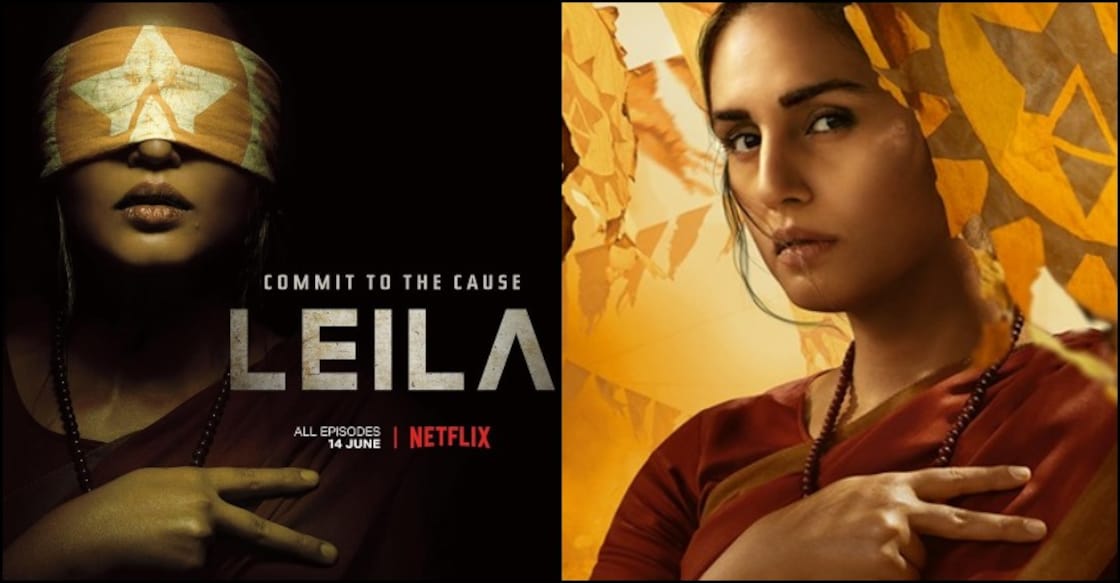Futuristic setting of Deepa Mehta's 'Leila' is rooted in today's India

Mail This Article
The year is 2047.
It’s been 3 years since the birth of Aryavarta, and incidentally, a 100 years since India's independence.
Dr Joshi, a new leader in his shining coat and endearing smile, has replaced Mahatma Gandhi as the ‘father of the nation.’
“Aryavarta is the greatest nation in the world,” blares across PA systems across every nook and corner of the state. “Peace by segregation” is its motto. It’s leader, Dr Joshi is given a deity like reverence, and his portraits adorn every beam and wall like in Kim Jong-un's Korea.
Cities are dissected by sky-high walls into various sectors, where different communities are granted permission to practice their own beliefs. Citizens here are always reminded that their lineage is their destiny. Slums inhabit its outer walls and clean air and water are its luxuries.
Leila, Deepa Mehta's resolute political outing is a dystopian drama set in the near future about a mother who is separated from her daughter, and put to endless suffering by an oppressive regime. Her sin? Marrying outside her community. In a bourgeois residence away from the morbid life in the ghettos on a fine morning, her home is attacked, her husband is lynched, and child taken away. She is then abducted and thrown into a rehabilitation camp. Shalini, our protagonist, is shocked to find that it’s inmates are all women who have also defied the patriarchy and married outside their communities. All of them suffer the same fate as hers.
An autocratic leadership believes that development could only take place through communal separation. Every resident is embedded with microchips under their skin, which are used to either grant or revoke entry into public places. ‘Mishrit,' or mixed blood kids are taken away into a 'Project Balee,' much like Hitler’s nazi Germany.
Aryavarta has evolved into a nation state that follows a strict no dissent policy. Dissidents are targeted, their homes raided and mobbed by violent 'bakhts' of the regime. Journalists writing against the government are scoured, and hacked to death. Children are made to watch ‘Bal Joshi' animated cartoons once out of their cradles. Hyper nationalism is the new cool and 'Jai Aryavarta' has conveniently replaced every greeting. I hope you could relate to who’s India it is by now.
But Aryavarta's ambitious government is keenly focussed on building a futuristic nation state, and initiates a SkyDome project that plans to engulf the city with air conditioned domes. Overlooking it’s many inherent flaws, an NRI scientist by the likes of Raghuram Rajan is invited to the state from America to helm this avant-garde proposal.
He soon finds it impractical, its implementation which would lead to the death of innocents. And just like real life Rajan, reel life Rajan falls out in favour of the administration and his business is soon dealt with.
Now though we are told that the year is 2047, some elements hardly add up in this post modern world set up by creator Deepa Mehta. And going by her vision, it would rather be a grim year to live in. Digital screens are the only devices where advancement seems to have taken place, and there are all glass mobile phones and curved screened laptops, with repair shops to service them. The automobiles used in the fairly advanced state of Aryavarta are all but cranked diesel engines barely past Bharat Stage IV emission rating. It should be surprising to note that an Indian Republic before Aryavarta had a stage VI emission norm in place way before in 2019. The Chevrolet, discontinued long ago in 2018, makes a strange come back and so does the classic Padmini and Ambassador, all in its original shape and form. A sorry fact is that halogen bulbs are still used in parts along the state. Drones are sent to silence the rebels, firing awkward shots during ‘surgical’ strikes without causing any collateral damage. Your clothes, china-ware, and every other conceivable thing are still stuck in the 2019 era. Leila is certainly a 'Blade Runner 2049’ on a budget.
Antiques aside, the drama is a mirror into the semi fascist agenda promulgated in the now.
The events taking place in the series are eerily similar to those happening today. Parallels have been drawn to the destruction of the Taj Mahal with a similar event in 1992, and the silencing of intellectuals and ‘anti-nationals’ in the state. The wealth and class divide that is existent in the suburbs of Mumbai, operation 'Beti Uthao' by the Sangh parivar in Assam and handing over pills to women to keep them working in Tamil Nadu.
Though critics are raving about the mini series, it hasn’t gone well with some factions of Hindu nationalists. There is an expected meltdown over the dystopian drama all over the internet, and online warriors have tirelessly worked to give shoddy rating for the series on sites such as the IMDb. The twitterati are still a confused boat with some calling it a 'Hinduphobic propaganda series,' lambasting and deeming it a threat to India's unity.
This is not the first time filmmaker Deepa Mehta has landed in hot soup for her work. She’s had horrifying experiences with various Hindutva outfits in the past too. Her 1996 film 'Fire' that featured an unexpected illicit relationship between two women released to much critical acclaim but had upset the Bajrang Dal and similar factions. They called her work blasphemous and went on a spree vandalizing theatres in a nationwide protest. The film was eventually banned. Her next movie, ‘Water’ the second in the trilogy dealt with the plight of poverty ridden Hindu widows in the Benares of the 30’s. The same faction attacked and destroyed film sets and started an agitation, which led to the government revoking its license to shoot citing law and order issues.
'Water' was then shot in Sri Lanka with an entirely new name and caste to stay under the radar. It went on to receive a standing ovation at the 2005 Toronto International Film Festival, and was Canada's official submission under 'Best Foreign Language film' category in the 2007 Oscars, an honour that could rightfully have been India’s.
Leila points a finger to the rise of militant religious extremism in a country not far from today. A place where harmony has no place, where one's religion defines his fate and destiny. The only reason it is a little underwhelming is perhaps because the reality of the present is far more dystopian than the series' apparently dystopian future.


